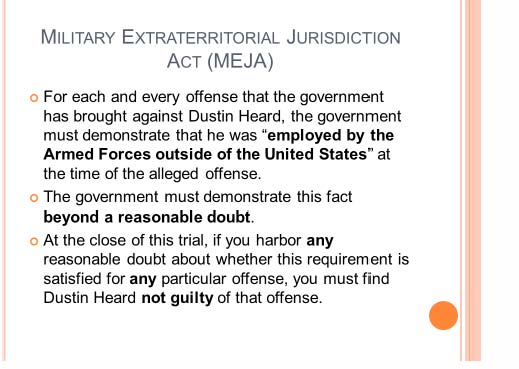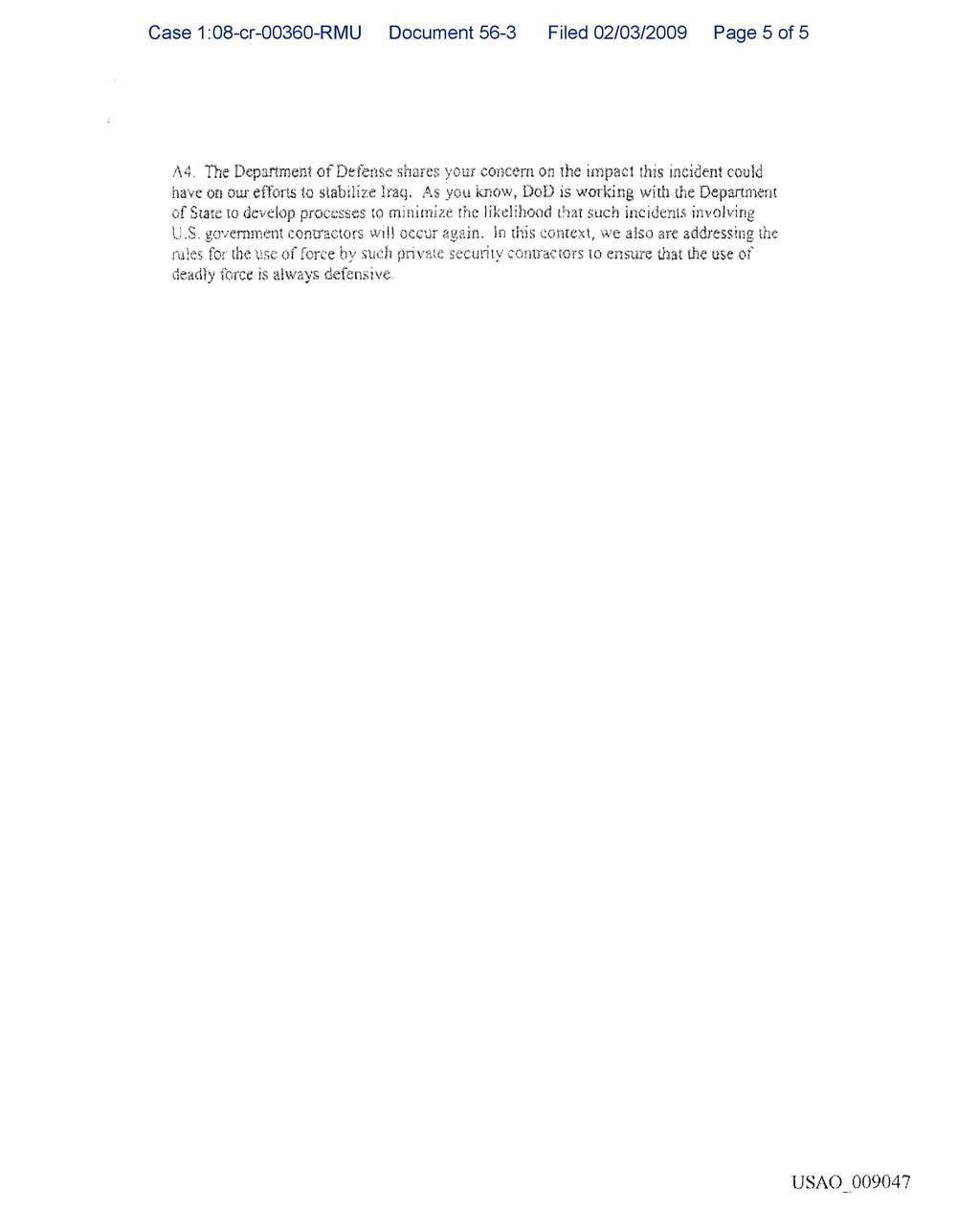No Jurisdiction
The esteemed non-profit, non-partisan National Association of Criminal Defense Lawyers filed an amicus brief in the Raven 23 appeal in support of overturning the Raven 23 convictions. In its brief, the NACDL agrees that the Raven 23 prosecution is illegal and "should have never happened" because the United States lacks jurisdiction over the case.
Yet, the D.C. Circuit Court of Appeals found no reversible error, and the Supreme Court of the United States refused to take up the case.

Setting aside the fact that the conclusion of the trial was so very wrong, the United States did not even have the jurisdiction to bring the case to begin with. The statute that they tried the case under, the Military Extraterritorial Jurisdiction Act, only applies to those working in support of the Department of Defense.
Although the slides below were prepared by counsel for Dustin Heard, the facts apply to ALL FOUR DEFENDANTS. And believe it or not, it also applies to the Fifth Man - the Government's cooperator. He also was not covered under MEJA and should NEVER have agreed to be.
It is important to note that the Government did NOT call ANY witness to support their assertion that these defendants were covered under MEJA. The defense, however, called Former Deputy Secretary of Defense, Mr. Gordon England. DepSec England testified at the trial that not only were these defendants, as Department of State contractors NOT supporting the "mission of the Department of Defense", but that, indeed, the Department of Defense supported the mission established by the Department of State. There could be no CLEARER testimony on the issue. You may be asking why no witness from the Department of State was asked to testify. Very simply, the DOS witness would have unequivocally supported the defense position. If the DOJ was going to speak for the DOD, it made more sense for the DOD to be represented, to speak for itself.

The Obama administration ALREADY KNEW this, because President Obama himself had inquired about jurisdiction in 2007 when he was Senator, and he received the same response directly from Gordon England. Representative Price (NC) also submitted similar questions to Mr. England and received the same response.
Jurisdiction Argument – Taken Directly from Court Transcripts
"For purposes of Rule 29, as the Court is aware, the indictment alleges that the defendants were employed by the armed forces outside the United States. Now, as I'm sure Your Honor recalls, subcontractors of non-DOD federal agencies, like the defendants, are considered employed by the armed forces only to the extent that their contract employment relates to supporting the mission of the Department of Defense.
Even with all legitimate inferences drawn in their favor, the government has failed to prove this element beyond a reasonable doubt. Here it's undisputed -- Defendants' contract employment under the Blackwater contract with DOS was to provide diplomatic security. And it was to provide diplomatic security for U.S. government personnel under the authorization of the chief of mission in Iraq, meaning the embassy. The WPPS-2 contract between Blackwater and the Department of State makes clear that Blackwater provided protective services in support of DOS's statutory mission to provide a secure environment for the conduct of U.S. foreign policy.
The contracts make clear, Blackwater contractors provided diplomatic security, a key DOS function under the direction and operational control of DSS agents – DSS agents from the regional security office. There's no dispute that all of the defendants operated under these contracts, and nearly every Blackwater witness who hit the stand testified to these features of their employment. The Court need look no further than the contract to decide this element. And indeed we contend the Court should not look further than the contract to decide this element.
However, to the extent that the Court finds extrinsic evidence, you know, relevant to this inquiry, that evidence in the record only reinforces the defendants were supporting the State Department mission and that their employment did not relate to supporting the Department of Defense mission. The government itself repeatedly and correctly drew a distinction between the Blackwater security operations and military operations. Witness after witness. They asked if the Blackwater protective services mission was a defensive mission that was separate and distinct from military operations which were primarily offensive. And every single witness agreed. They were different types of missions, separate and distinct from one another.
Several witnesses testified regarding the details of their employment, including that the Blackwater chain of command reports to DOS. Not DOD. The Blackwater contractors operated under rules and regulations issued by DOS, not DOD. Blackwater training curriculum set by DOS, not DOD. DOS issued use of force rules to its contractors, whereas DOD entities operated under rules of engagement. Blackwater contractors did not take part in military operations. They took part in DOS protective security missions, and to that end DOS set their assignments, not DOD. To the extent the RSO coordinated with the military at all, as Chuck Pearson referred to it, it was only for de-confliction, the sole purpose of which was to ensure that they didn't take embassy personnel into the middle of an active military operation. But that's it.
Most importantly, however, it is beyond dispute that the material conduct, the charged conduct in this case, occurred while this team was doing a tactical support mission to aid the evacuation and return of a U.S. aid official to the Green Zone. This is right in the wheelhouse of the State Department's diplomatic security mission, and it doesn't have anything to do whatsoever with the military or the defense department. Based on the evidence in the record regarding the contract provisions, DOS's operational control, DOD's total lack of operational control or involvement in Blackwater taskings, and the purely Department of State mission that Raven 23 undertook on September 16, 2007, no reasonable juror could find beyond a reasonable doubt that the Defendant’s employment related to supporting the Department of Defense's mission. Unless Your Honor has any questions, that concludes my argument."
Even more telling as to the ineffectiveness of MEJA to cover DOS contractors, was the introduction of House Bill H.R. 4567 on February 2, 2010, by none other than Rep. Price (NC) himself. So here's the question you need to be asking - IF MEJA was sufficient cover these contractors, why was there a need to draft a separate Act??
http://thomas.loc.gov/cgi-bin/query/z?c111:H.R.4567.IH:












